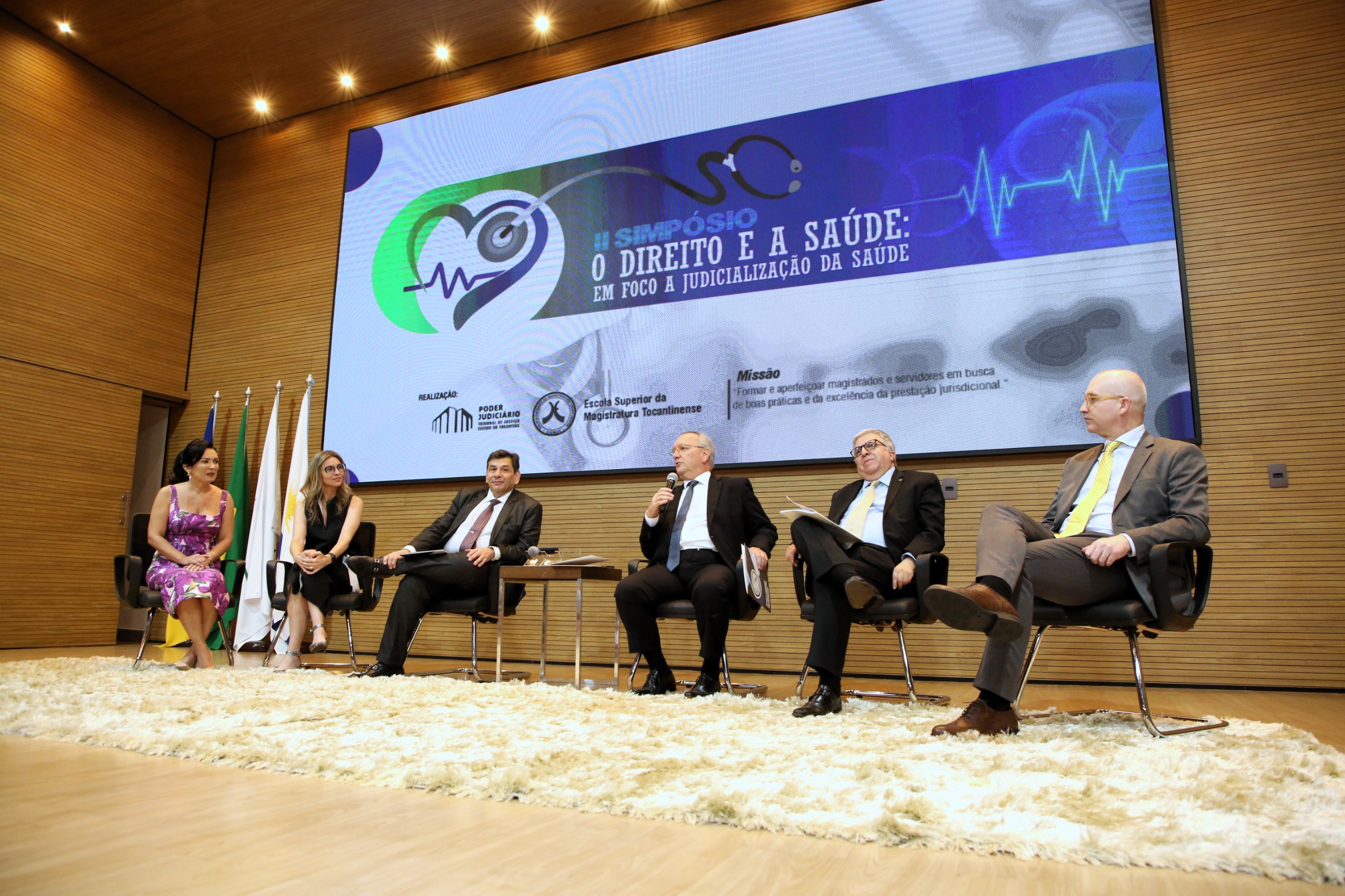
Technological evolution, epidemiological mix, finite resources x growing risk, evolution of knowledge, cultural changes and climate change. These were some of the bottlenecks presented by the Director-President of the National Supplementary Health Agency (ANS), Paulo Rebello, in the lecture on "The regulatory role of the ANS: current challenges", which opened the afternoon of discussions at the II Symposium on "Law and Health: focusing on the judicialization of health", held this Friday (June 7th), in the auditorium of the Court of Justice of the State of Tocantins (TJTO), through the Superior School of the Judges of the State of Tocantins (Esmat).
According to the ANS, it is estimated that private health spending accounts for 5.7% of the Gross Domestic Product (GDP). After all, health insurance is the third largest consumer item for the Brazilian population and this has ensured that the 671 health operators have more than 51 million beneficiaries, earning R$ 275 billion. In dental care, there are 33 million beneficiaries in 328 operators, earning R$4.3 billion. The figures are for 2023.
However, the President of the ANS, Paulo Rebello, warns: "Although it is an area that makes a lot of money, it must be emphasized that the operator doesn't have any money. It's the beneficiaries who pay the monthly fees who have the money. They are responsible for managing the resources so that the beneficiary is able to use this operator when they have a medical request," explains Rebello, also pointing out that with regard to the new technologies that have been incorporated, individual court decisions have an impact on all operators. "Every Brazilian wants to have a health plan, but the majority are small and medium-sized operators based in the far corners of our country. And when a magistrate makes a decision to incorporate a new technology or a high-cost medicine, 20% of these operators can't afford it and go bankrupt. They impact on the community and all the beneficiaries end up paying, because there is no free lunch," he concluded.
The panel was coordinated by Judge Lauro Augusto Moreira Maia of the TJTO.
Health fraud
Fraudulent schemes such as the creation of shell companies, reimbursement fraud, false plans, inconsistencies in requests and procedures, false signatures, altered bill identifiers, procedures created but not carried out, among others, were the subject of the "Panel on Anti-Fraud in Supplementary Health" presented by the medical superintendent of the Brazilian Association of Health Plans (Abramge), Cássio Ide Alves. The panel was coordinated by Judge Gil de Araújo Corrêa.
"Fraud brings in a lot of money, but those who commit fraud aren't defrauding a health plan or an operator, they're defrauding the entire community, because the resources come from individuals, families and companies. Fraud poses a threat to mutualism and the intergenerational pact and it has important regulatory, sustainability and safety impacts."
On the occasion, the speaker used the example of the reimbursement fraud and the supply of Orthoses, Prostheses and Special Materials (OPME), the latter of which came to light in 2015 with the CPI of the Prostheses Mafia CPI. Following this crisis, bodies such as the ANS and the National Health Surveillance Agency (Anvisa) took some measures such as the creation of a technical working group by the ANS, the Normative Resolution No. 424/2017 which deals with the criteria of the Medical Board, qualification of surgical protocols, Resolution of the Collegiate Board (RDC) Anvisa for economic monitoring to accompany the OPME sector which has more than 80,000 registrations in Brazil, international regulation contract of ANVISA.
Reimbursement has always been a normal practice. However, since its regulation in 2022, according to the Third Panel of the Superior Court of Justice (STJ), the following criteria have been defined for reimbursement: service provided; actual payment of the amount charged; proven payment; no assignment of rights. "Reimbursement fraud is not the most important, but it is highlighted, since this regulation, many of these types of evidence are produced based on these criteria, such as the proof of false procedures, overpriced reimbursement based on the criteria, among others," he explained.
Medicine based in evidences
The coordinator of the Health Technology Assessment Center and Evidence Center at the Syrian Lebanese Hospital, Rachel Riera, gave the last lecture of the day. It was entitled on "Science in Judicial Decision-Making in Health". The coordinator was Judge Marcelo Laurito Paro, from the Court of Justice of the State of Tocantins.
"Good science is in the midst of bad science and this gives us a great responsibility, to identify good science and put aside that which leads us away from the truth. Just as there are good and bad decisions in law, there are good and bad decisions in science. Health decision-making needs to be informed by the best scientific evidence available. To do this, we need to know how to identify where this good evidence is, developing a good critical view of health, for example," said speaker Rachel Riera.
Evaluating Technical Notes produced by the Technical Support Center for the Judiciary (NatJus), designed to assess the potential effects for specific cases, are scientific products made by health technology agents (HTAs) to subsidize the magistrate. "The technical note is a valuable tool for the magistrate. Therefore, it has to have accessible language, we can't overload on technical terms, the magistrate has to understand what the health professional is talking about," he concluded.
After the lectures, a debate was opened with the seminar participants, led by the President of the Comprehensive Health Care Management Committee of the Judiciary, Justice Pedro Nelson de Miranda Coutinho, who also handed out the certificates of the speakers.




